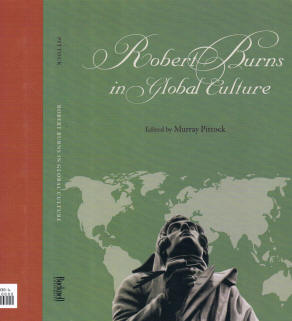|
Reviewed
by Frank R. Shaw, FSA Scot, Dawsonville, GA, USA
Email:
jurascot@earthlink.net

Murray Pittock
 One
of the joys of reviewing a good book is when it is written or edited by
someone who knows what he or she is doing. Murray Pittock is such a man. A
talented writer, author and speaker, he serves as Bradley Professor of
English Literature, head of the College of Arts and a vice-principal at the
University of Glasgow. Murray has written or edited many books on a variety
of subjects, so it is always a treat when he takes pen in hand to write
about Robert Burns. The treat in this case is found in Murray’s introduction
as well as the first chapter entitled “A Long Farewell to All My Greatness”:
The History of the Reputation of Robert Burns. This is an excellent book,
and you will quickly see why Murray Pittock is one of my favorite writers. One
of the joys of reviewing a good book is when it is written or edited by
someone who knows what he or she is doing. Murray Pittock is such a man. A
talented writer, author and speaker, he serves as Bradley Professor of
English Literature, head of the College of Arts and a vice-principal at the
University of Glasgow. Murray has written or edited many books on a variety
of subjects, so it is always a treat when he takes pen in hand to write
about Robert Burns. The treat in this case is found in Murray’s introduction
as well as the first chapter entitled “A Long Farewell to All My Greatness”:
The History of the Reputation of Robert Burns. This is an excellent book,
and you will quickly see why Murray Pittock is one of my favorite writers.
This book's dedication reads
"For Clark, a Global Scot." No one needed to tell me who Clark was since it
could have been none other than Clark McGinn. Clark has several articles
found in the chapters of Robert Burns Lives! and I do not think I have
ventured too far out on a limb to reveal to whom the book is dedicated.
Clark is one of my staunch supporters and a major contributor to these
pages. He travels more miles every year to speak about Burns than anyone
else on earth. In an email today he writes in the last seven years he has
traveled 141,100 miles or the equivalent of five and a half times around the
globe giving 92 speeches in 25 different cities in 14 countries. "All carbon
neutral (!)"
What’s so special about
another critical book on Burns, you may ask? Naturally, some of the usual
suspects are found in the table of contents writing the more than twelve
chapters about our Bard. Yet, there are indeed some new names that I look
forward to meeting one day to put with faces. The writers reflect the
influence of Burns in Europe, America, the United Kingdom, the theatre, and
world-wide Burns gatherings. It is a book about our global village
concerning a global poet, Robert Burns, who has been shuttered like an
outdated mercantile store by an academic community that no longer includes
him among top poets, romantic or otherwise. The book paints an all too vivid
picture of how and when Burns virtually disappeared from romantic
literature. The case is made that more and more people (including academics)
should rightfully take another look at Robert Burns in today’s world and
recognize him for the contributions he has made to literature, music and
poetry. He does not stand at the back of the line to anyone!
Some stories will live
forever, and I believe you will find in this critical study that the story
of Robert Burns is one of them. By their skills, insights and critical
writings, the writers have placed Robert Burns in Global Culture at the
pinnacle of the “top ten” of all-time critical studies regarding Burns. It
is indeed a noteworthy body of work by gifted writers. Therefore, I feel
Pittock’s book represents THE cutting edge of critical study on Burns today.
It is an essential book for any person serious about the rightful place of
Burns in town or gown. With this book Pittock has placed his foot in the
door to prevent it from continually being closed to Burns. It is possible
that with books like Robert Burns in Global Culture the door can be opened
for him to be in fashion again amongst academics, if they will judge him
with open minds, and this publication is a good place to start.
In conclusion I turn to
Quintus Horatius Flaccus, a.k.a. Horace the ancient Roman poet, who uttered
those famous Latin words, non omnis moriar, “Not all of me will die.” If
applied to Burns, it expresses my belief that a part of Robert Burns has
survived beyond his death - his life’s work. That is just another reason
these pages are named Robert Burns Lives! and that is why we are talking
about Burns in 2011 when he died in 1796.
In addition to this review,
you may also want to read a review of Scottish and Irish Romanticism by
Murray Pittock in Chapter 97 of Robert Burns Lives!. Additional insight into
Robert Burns awaits you!
(FRS: 11.30.11) |

